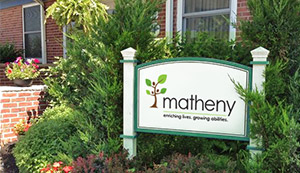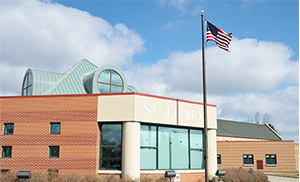Posted on September 16, 2013 by Matheny

Speech-language pathologist Jaclynne Dietrich works with student Scott Gordon on his communication skills.
The Matheny School will be holding an Open House on Wednesday, October 9, from 10 a.m.-12 noon to showcase its various programs for students with multiple disabilities. These include:
- Preschool. Supported through an adapted environment using emergent technology, communication systems and the individual education plan.
- Elementary K-8. Utilizing a “centers approach” where students have the opportunity to participate with their peers to learn tasks via hands-on activities.
- High School 9-12+. Study of traditional academics, such as biology and U.S. history plus transition and elective classes that help students prepare for adulthood.
- Adapted Physical Education. Promoting fitness through all traditional sports, modified to encourage students to create their own independent movements.
- 21st Century Life Skills. Taking what is learned in the classroom and applying it to real-life situations.
- Speech therapy. Providing individual and integrated services as well as in-class language groups.
- Occupational Therapy. Facilitating students’ access to their environment with as much independence as possible.
- Social Services. Promoting the emotional well-being and adjustment of each student to maximize academic growth and physical functioning.
- Physical Therapy. Customizing positioning and exercise routines using standing and adaptive bike riding.
- Psychology. Working as a team with school staff and parents/guardians to understand the meaning behind behaviors viewed as inappropriate or unsafe.
For more information or to R.S.V.P., call Jill Baker at (908) 234-0011, ext. 234, or email mathenyschool@matheny.org.

Occupational therapist Wendell Lumapas helps student Michael Taurozzi use switches to access a computer.
Posted on September 13, 2013 by Matheny

Margaret “Peggy” Zappulla.
“I teach my students that, if there is something in life that you want to do, nothing should stop you.” It’s that kind of dedication and perseverance that makes Margaret “Peggy” Zappulla an outstanding teacher and the reason she has been selected as one of Exceptional Parent Magazine’s “Exceptional Educators for 2013.” Zappulla will be featured in EP’s September 2013/Annual Education issue along with the other 2013 exceptional educators from around the country.
Zappulla was nominated for this award by Sean Murphy, The Matheny School principal, who said, “Margaret Zappulla is not your typical teacher. Margaret is always aspiring to reach new heights, and some of her biggest contributions have been on our technology committee where she successfully rolled out initiatives to have assistive switches distributed to every student in the school.”
Adds Zappulla: “The students I work with work hard, and they never give up. I will not let them. I have a responsibility to provide them with the encouragement, tools and support to help them reach their goals.”
Posted on September 11, 2013 by Matheny

Scott Beil facilitating for James Lane, an artist who has been with the program from the beginning.
While studying arts education at The College of New Jersey, Scott Beil, who grew up in Chester, NJ, volunteered in Matheny’s Arts Access Program during the summer. He was so taken by the Arts Access concept that he trained to become a facilitator, eventually becoming studio manager. Arts Access enables people with disabilities to create fine art, assisted by professional artist-facilitators.
Beil left Matheny in 2007 to join the Willow School in Gladstone, NJ, where he is art teacher, co-director of the middle school and an advisor. However, when Arts Access celebrates its 20th anniversary at Full Circle 2013: Reflections on Saturday, November 2, Beil will be returning as curator of the visual arts exhibit.
A working artist whose paintings and drawings have been shown at galleries in New Jersey and New York City, Beil received the Somerset Cultural and Heritage Commission’s “Excellence in the Arts” award in 2007. He was recently accepted into the “Connecting Collections Program,” a prestigious summer institute for teachers from around the world, hosted by New York City’s top museums including the Museum of Modern Art, the Guggenheim and the Whitney.
As he prepares for Full Circle, Beil says he is “deeply honored for the opportunity to put this show together, and it is my deepest intention to respectfully highlight the strong caliber of work that our artists have quietly been creating upon this little hill in Peapack over the past 20 years.”
Full Circle 2013: Reflections will be held from 3-6 p.m. on Saturday, November 2, in the Robert Schonhorn Arts Center at Matheny. For more information or to order tickets ($30), call (908) 234-0011, ext. 260, or email pcats@matheny.org.
Posted on September 9, 2013 by Matheny

Mike and Bo Geraghty, second from right, with other members of “Team Bo” at the 2013 Miles for Matheny, an annual fundraiser and community event.
Mike and Liz Geraghty of Cranford, NJ, are the parents of Bozena Geraghty, a resident at Matheny. Bo was born with Cornelia de Lange syndrome, a genetic disorder that causes a range of physical, cognitive and medical challenges. Bo is 22 years old and has been at Matheny for four years. According to her father, “she has thrived, as the staff at Matheny has provided a level of care and opportunity we never could have imagined. Most look at Bo and see what she can’t do. Matheny turned that view on its head and looks at her for what she can do.”
A recent decision by a Superior Court judge in Somerset County, NJ, has upheld a 2011 decision by the Peapack-Gladstone, NJ, Land Use Board to reject a proposed expansion and renovation by Matheny. That rejection was based primarily on complaints by neighbors that increased traffic caused by the expansion would make Highland Avenue, the road leading up to Matheny, more unsafe and would imperil the lives of those using it.
While those decisions were disappointing to the Geraghtys, Mike Geraghty prefers to “shine a light on those who make Matheny the success it is, rather than focusing on those responsible for blocking the expansion.” He does acknowledge, though, that his daughter may have been accountable for some of the traffic on Highland Avenue because, “the Matheny staff has taken her camping, ice skating, bowling, horseback riding, fishing and to the beach. And this past year, she finished an assisted 25-meter walk at the Somerset County Special Olympics.”
He also has a message for the neighbors who opposed Matheny’s expansion and renovation. “You can attend church every day for the rest of your life,” he says, “but if you really want to see God’s work being done, then take a ride to the top of Highland Avenue.”
Posted on September 5, 2013 by Matheny

Physical therapist Lisa Tumminelli helps a student use a power wheelchair during a visit to the Great Meadows, NJ, Regional School District.
The Matheny School’s adapted physical education program promotes fitness for all by modifying traditional sports to encourage students to create their own independent movements. In addition, health and wellness activities are provided to enhance decision-making skills and promote team building.
Students are able to demonstrate their skills with peers in the community via visits to physical education classes at public and independent schools. The goal of these visits is to promote interaction between both groups of students and to enable them to compete as peers.
The principal of one school that Matheny visited said her students “spoke about their experience for most of the day. I enjoyed watching the transformation from apprehension to total inclusion.”
Schools interested in participating in this program should contact Jim Hintenach at (908) 234-0011, x239, or jhintenach@matheny.org.
Posted on September 3, 2013 by Matheny

Wharton library director Kassundra Miller with artists Josh Handler, left, and Alex Martinez.
Digital art and paintings by 11 Arts Access artists have been on display during July and August at the Wharton Library in Wharton, NJ. On Friday, August 16, the artists were recognized with a special reception at which some of their writing talent was also celebrated.
Sonya Kimble-Ellis, Arts Access writing facilitator, and Peter Giessner, Arts Access transporter, took turns reading short pieces of prose that had been written by the artists.
Arts Access makes it possible for people with disabilities to create fine art, assisted by professional artist-facilitators. The art covers a wide range of disciplines, not only painting, digital art and prose, but also dance, drama, poetry and sculpture.

Arts Access writing facilitator Sonya Kimble-Ellis reads “After the Movie” as the author Karen Frascella looks on.
Posted on August 28, 2013 by Matheny

From left, Jenna, Jacob, mother Lauren and sister Callie.
Jacob Poleyeff has been dropping off and picking up his 11-year-old daughter Jenna at Matheny since May 2012, when she was admitted with a rare seizure disorder known as Lennox-Gastaut Syndrome.
“I would estimate that I’ve now taken about 250 trips up or down Highland Avenue in Peapack,” he says. “I can count on one hand the total number of cars that have passed me in the other direction on all 250 trips. And I have seen zero children – not one – on that road the entire time.”
Yet, a proposed expansion and renovation by Matheny to add 40 beds and about 60 employees was defeated by the Peapack-Gladstone Land Use Board in 2011, primarily based on complaints by neighbors that the increased traffic caused by the expansion would cause the road to become more unsafe and imperil the lives of those using it. That decision was recently upheld by a Superior Court judge in Somerset County.
The traffic issue, says Poleyeff, “is really nonsense. I would encourage anyone curious to take a drive up there and try to imagine how 60 additional cars a day – what’s that, one every 12 minutes? – could possibly impact the safety or even affect the lifestyles of these residents. While you’re at it, stop and visit Matheny and see some of the kids and the activities that take place. The entire outrage of what’s going on up there will become quite clear.”
“My daughter,” adds Poleyeff, “was lucky that a place opened up for her, but so many kids and their folks are waiting desperately. Forty openings doesn’t sound like a lot, but for those families, it would have made a world of difference.”
Posted on August 26, 2013 by Matheny
 By Gary E. Eddey, MD
By Gary E. Eddey, MD
Vice President for Medical Affairs and Chief Medical Officer
The most important aspect of the care of Lesch-Nyhan patients from both the practitioner and health system perspectives is collaboration with the parents and/or patient. A close second is the ability of the healthcare provider to demonstrate adaptability of the system and individuals involved when confronted with new challenges.
Lesch-Nyhan is a rare X-linked, recessive genetic disorder associated with cognitive impairment, hyperuricemia, renal involvement and the hallmark symptom, severe self-injurious behaviors. There are endless behavioral issues that have to be addressed when caring for a Lesch-Nyhan patient. Among them:
- Safety issues relating to transportation.
- Equipment issues relating to wheelchair seating systems.
- Availability of transition care.
For these issues and many more, it is important for a healthcare institution to recognize the necessity of crossing departmental and institutional lines. It is also important that healthcare providers be able to collaborate with parents and other relatives of LND patients.
Third in a series of four articles on Lesch-Nyhan Disease. For more information, feel free to call Gary E. Eddey, MD, at 908 234-0011, ext. 737.
Posted on August 23, 2013 by Matheny

Teresa Radebaugh, left, and Susan Pospischil.
Business was brisk at First Chance at Second Chance, the August 14th one-day sneak preview of all merchandise to be featured at the Second Chance Shop, the thrift shop operated by The Friends of Matheny, the auxiliary group that raises funds to benefit Matheny’s students and patients.
One of the busiest customers was Susan Pospischil from Defiance, MO, who was visiting Chester, NJ, resident Teresa Radebaugh. Pospischil was buying lots of sweaters and purses to take back to the Midwest, while Radebaugh was buying books and other items for her first grandchild, soon to arrive. During the regular Second Chance season, which resumes on September 3, Radebaugh volunteers at the shop.
The Second Chance Shop is located adjacent to the United Methodist Church on Jackson Avenue in Gladstone, NJ. The Friends of Matheny has raised more than $3 million for Matheny’s students and patients since its inception in 1983.
Posted on August 21, 2013 by Matheny

Dr. Kenneth Robey.
Because of their medical complexities, children and adults with complex disabilities find the transition to and from acute care hospitals very difficult. Often hospital staff members are not familiar with the patients and not well prepared to address all of their complex needs.
Two years ago, Matheny received a grant from the Robert Wood Johnson Foundation’s New Jersey Health Initiatives program to help us address this problem. A key element was the appointment of a full-time transition care nurse, who helps provide an unusual degree of interaction between Matheny staff members and acute care hospital staff members.
On Friday, September 6, three Matheny staff members will participate in a conference devoted to this subject. The conference is being held at Morristown Medical Center and is sponsored by MMC and the Northern New Jersey Network of the Developmental Nurses Association. The three Matheny presenters are:
- Kenneth Robey, Ph.D, director of the Matheny Institute for Research in Developmental Disabilities, who will give the keynote address: “The Health Care Transition for Persons with Intellectual and Developmental Disabilities.”
- Jeanne Lavelle, BSN, Matheny transition care nurse, who will speak about “Innovations in Care Coordination in Hospitals for Persons with I/DD.”
- Gaila Call, BSN, CWOCN, Matheny wound, ostomy and continence nurse, who will talk about “Steps That Will Make a Difference During Hospitalization.”
Atlantic Health System, Robert Wood Johnson University Hospital and Somerset Medical Center are Matheny’s partners in the transition program. More information about the conference can be obtained by calling 1-800-247-9580 or emailing dsykes@matheny.org.

Jeanne Lavelle, BSN, transition care nurse.
Posted on August 19, 2013 by Matheny

Jacob works on his math with Matheny School teaching assistant Kristin Barone.
When he was around 2½ years old, Jacob Rolaf showed signs of bruising and was diagnosed with mild hemophilia. About 4½ years later, he began to experience gastrointestinal bleeding and, as a result, needed to be treated with high doses of blood coagulation factors. A resulting infection caused him to develop septic shock and multi-organ failure. “Before that,” says Lisa Cohen, a social worker at Rutgers Robert Wood Johnson Medical School Hemophilia Center in New Brunswick, N.J., “he was an average kid. But he developed sepsis, multi-organ failure, central nervous system injury and seizure disorder. That really started all of his multiple medical issues.”
From that point on, Jacob was in and out of the hospital. At home in Toms River, N.J., he had special accommodations and lots of nursing support. Then his mother became ill and was unable to care for him physically. He was placed in an institution that provided transitional care to infants and children with specialized medical needs. “His hemophilia had stabilized,” Cohen says, “but we needed to find a long-term placement that had the therapies he needed and so he would not just sit all day.”
In December 2012, a representative of the state office of Child Protection and Permanency (formerly the Division of Youth and Family Services) contacted Matheny regarding permanent placement for Jacob. He eventually was admitted as a resident in May 2013. “He really needed a place like Matheny,” Cohen says. “Seeing him there is wonderful. You can see it on his face. You can see the difference.”
Posted on August 16, 2013 by Matheny

Dr. Gary E. Eddey.
By Gary E. Eddey, MD
Vice President for Medical Affairs and Chief Medical Officer
Protective devices are, at times, controversial, but they are essential to use for individuals with Lesch-Nyhan disease.
Professionals who are unfamiliar with LND may perceive the use of these protective devices as a form of restraint. But when protective devices are requested by the patient and used to safeguard the patient from him or herself, the outcome is an extraordinary feeling of comfort and safety. Not allowing the patients to use protective devices, in fact, would violate their autonomous rights.
Individuals with LND appear at times to be very high functioning in an intellectual way, although they are limited in some aspects of their cognition. Their self-injurious behavior goes against what they want to do. So, the behaviors they exhibit to parents, caregivers and to themselves can be very difficult to understand. Caregivers need continuing support on how to best cope with and care for those individuals in order to promote the positive aspects of the person. As mentioned previously, treatment of individuals with LND should include use of a behavioral technique commonly referred to as selective ignoring, with redirection of activities.
Second in a series of four articles on Lesch-Nyhan Disease. For information, feel free to call Dr. Eddey at 908 234-0011, ext. 737.

















